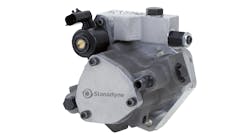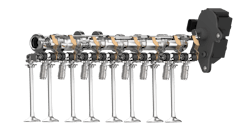There is little argument around the fact that most motorists want to save at the pump. What most vehicle owners may not realize, however, is that lubricants play an important role in fuel efficiency. According to www.fueleconomy.gov, following the manufacturer’s motor oil recommendation can improve gasoline mileage by up to two percent, minimize emissions and potentially save money by preventing repair costs for engine damage.*
With this in mind, Shell scientists dedicated to the study of Tribology - the science of friction - are leading the charge to develop advanced lubricants by working closely with original equipment manufacturers (OEMs), as well as academia.
Getting the balance right in the relationship between friction, wear and lubrication can help to solve lubrication issues and help improve fuel economy and energy efficiency. Tribology can play a crucial role in meeting increased demands such as new government regulations that will nearly double fuel economy by 2025 to 54.5 miles per gallon.
“Lubricants play a significant role in achieving fuel efficiency,” said Dr. Allie Falender, Shell innovation technology manager. “Shell Lubricants has been able to attain significant fuel efficiency improvements by working directly with OEMs to co-design the engine and lubricant. We continue to work in collaboration with technical alliances to overcome specific challenge areas such as increased fuel economy, energy efficiency, durability, and wear protection.”
One example of successful collaboration is the work Shell carried out with Gordon Murray Design. Shell worked with this leader in automotive design to improve the fuel efficiency of its new T.25 concept city car. A new concept lubricant developed by Shell could improve the car’s fuel efficiency by up to 6.5% in EU urban cycle compared with 5W-30. With government mandates increasingly driving OEMs and suppliers to search for ever greater efficiencies in order to reduce emissions, the development of this concept lubricant and co-engineering approach is significant for manufacturers facing significant fines on an excess-grams-per-kilogramme basis.
Shell also collaborates with the Sloan Automotive Laboratory at Massachusetts Institute of Technology (MIT) and a number of auto and truck manufacturers in the research and development of high value, sustainable technologies designed to drive innovation in energy delivery through the Lubrication and Internal Combustion Engines Consortium. The MIT collaboration is addressing future and emerging technologies that demonstrate game-changing potential for the energy industry.
The work being done with MIT is focused on a broad array of existing and new oil and gas technologies, including next-generation applications in nanotechnology, biochemistry, electronics and computer modeling. Other focus areas include research into greater fuel efficiency, new solar energy applications and enhanced catalytic technology for advanced fuel cells and smart grids.
Earlier this year Dr. Wei Yuan with Shell Global Solutions traveled to MIT to bring some of tomorrow’s brightest minds up to speed on the challenges and opportunities facing tribologists in an ever demanding world. She discussed some of the additives that transform base oils into highly specialized lubricants that can increase efficiency.
In addition to technical alliances with companies and universities for research, Shell Lubricants created innovative techniques to help work through industry challenges and generate novel ideas. With one tool called Speed Matching, participating customers and thought leaders are placed into “couples,” where they talk about lubrication challenges in their particular industry and discuss potential solutions. They have limited time to formulate their best idea before they share with the broader group for discussion.
In April, a Speed Matching session was held during the Shell Eco-marathon Americas in which engineering and science students from around the world design, build and test ultra energy-efficient vehicles. Students had the opportunity to participate in lively break-out discussions covering challenges using Tribology to solve lubrication issues and help improve fuel economy.
“Growing demands to be more energy efficient have crossed virtually every industry,” said Falender. “Lubricants play an important role in that efficiency, especially when it comes to mobility. Shell scientists will continue to foster dialogue and research with industry experts and other thought leaders to identify challenges and discover solutions for further improving fuel efficiency.”
Subscribe to Motor Age and receive articles like this every month…absolutely free. Click here

